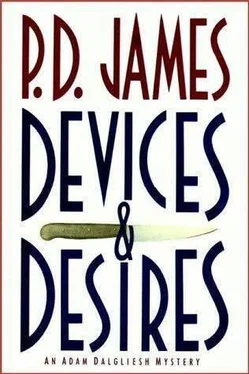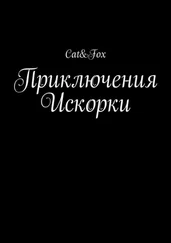He turned off the B149 at Felthorpe to take the country roads across the flat country. It was unnecessary to consult the map. The magnificent fifteenth-century tower with its four pinnacles was an unmistakable landmark and he drove towards it along the almost deserted roads with the familiar sense of coming home. It seemed strange that his aunt's angular figure wasn't beside him, that all that remained of that secretive but powerful personality was a plastic package, curiously heavy, of white grit. When he reached Salle he parked the Jaguar a little down the lane and made his way into the churchyard. As always, he was struck that a church as magnificent as a cathedral could be so isolated yet seem utterly right among these quiet fields where its effect was less of grandeur and majesty than of an unpretentious and reassuring peace. For a few minutes he stood quietly listening and heard nothing, not even a bird song or the rustle of an insect in the tall grasses. In the frail sunlight the surrounding trees were flushed with the first gold of autumn. The ploughing was over and the brown crust of the crumbled fields stretched in their Sunday calm towards the far horizon. He walked slowly round the church feeling the weight of the package dragging at his jacket pocket, glad that he had chosen a time between services and wondering whether it might not have been courteous, perhaps even necessary, to obtain the consent of the parish priest before carrying out his aunt's wishes. But he told himself that it was too late to think of that now, glad to be spared explanations or complications. Making his way to the eastern fringe of the churchyard he opened the package and tipped out the ground bones like a libation. There was a flash of silver and all that remained of Jane Dalgliesh sparkled among the brittle autumn stalks and the tall grasses. He knew the customary words for such an occasion; he had heard them often enough on his father's lips. But the ones which came unbidden to his mind were the verses from Ecclesiastes carved on the stone outside Martyr's Cottage and in this timeless place beside the dignity of the great church it seemed to him that they were not inappropriate.
The west door was unlocked and before leaving Salle he spent fifteen minutes in the church revisiting old pleasures: the carvings on the oak stalls, peasants, a priest, animals and birds, a dragon, a pelican feeding its young; the medieval wineglass pulpit, which after five hundred years still showed traces of its original colouring; the chancel screen; the great east window which once had glowed in the glory of red, green and blue medieval glass but which now let in only the clear Norfolk light. As the west door clanged gently behind him he wondered when he would return, or if he would return at all.
It was early evening before he got home. What he had eaten of lunch had been stodgily filling so that he was less hungry than he had expected. He heated up the last of yesterday's home-made soup and followed it with biscuits and cheese and fruit and then kindled the fire and sat on the low chair before it, listening to Elgar's Cello Concerto and making a start on the job of sorting out his aunt's photographs. Tipping them out of their faded envelopes he sorted them with his long fingers on the low mahogany table. It was a task which induced a gentle melancholy from which an occasional scribbled identification on the back of a print, a remembered face or incident, would stab him into pain. And the Elgar was an appropriate accompaniment, the plaintive notes evoking those long, hot Edwardian summers known to him only from novels and poetry, the peace, the certainty, the optimism of the England into which his aunt had been born. And here was her fiancé, looking ridiculously young in his captain's uniform. The photograph was dated 4 May 1918, only a week before he was killed. He gazed for a moment intently at that handsome, debonair young face which, God knew, must by then have seen enough of horror, but it told him nothing. Turning it over Dalgliesh saw that it bore a pencilled message written in Greek. The young man was to have read Classics at Oxford and his aunt had studied Greek with her father. But he knew no Greek; their secret was safe enough with him and soon would be safe for ever. The hand which had formed these fading characters had been dead now for seventy years, the mind that had first created them for nearly two thousand. And here, in the same envelope, was one of his aunt herself at about the same age. It must have been one she had sent to her fiancé at the Front or given to him before he left for war. One corner was stained browny-red with what must be his blood; perhaps the photograph had been returned to her with the rest of his effects. She stood in her long skirt with the high-buttoned blouse, laughing, her hair in two wings on either side and bound above the temples. Over the years her face had always had distinction, but he saw, almost with a shock of surprise, that once she had been beautiful. And now her death had freed him for a voyeurism which in her life would have been repugnant to them both. And yet she hadn't destroyed the photographs. She must have known, realist that she was, that other eyes than hers would eventually see them. Or did extreme old age free one from all such petty considerations of vanity or self-esteem, as the mind gradually distanced itself from the devices and desires of the flesh? It was with a sense of irrational reluctance, almost of betrayal, that eventually he threw both photographs into the fire and watched them curl, blacken and finally flare into ash.
And what was he to do with all these undocumented strangers, the women, sloping-bosomed, under immense hats piled with ribbons and flowers, the cycling parties, the men knickerbockered, the women with their long, bell-shaped skirts and their straw boaters; the wedding parties, bride and bridesmaids almost hidden behind their immense bouquets, the chief participants grouped in recognized hierarchy and staring into the lens as if the click of the shutter could for a second halt time, hold it in thrall, proclaiming that this rite of passage at least had importance, binding the ineluctable past to the unseeable future? As an adolescent boy he had been obsessed with time. For weeks before the summer holidays he would feel a sense of triumph that now he had time by the forelock and could say, 'Go as quickly as you like and the holiday will be here. Or if you must, go slowly, and the summer days will last longer.' Now, in middle age, he knew of no contrivance and no promised pleasure which could halt the inexorable thudding of those chariot wheels. And here was a photograph of himself in his prep-school uniform, taken in the rectory garden by his father, a stranger ridiculously over-clad in cap and striped blazer standing almost to attention, facing the lens as if defying the terror of leaving home. That, too, he was glad to see the end of.
When the concerto was finished, the half-bottle of claret empty, he shuffled the remaining photographs together, placed them in the bureau drawer and decided to shake off melancholy with a brisk walk by the sea before bed. The night was too calm and beautiful to be wasted in nostalgia and futile regrets. The air was extraordinarily still and even the sound of the sea was muted as it stretched, pale and mysterious, under the full moon and the bright pattern of stars. He stood for a moment under the soaring wings of the mill then began walking vigorously over the headland towards the north, past the fringe of pines, until, three-quarters of an hour later, he decided to make for the beach. He half slid down the sandy decline and saw before him the great square hunks of concrete half buried in the sand, the curls of rotting iron springing from them like bizarre antennae. Moonlight, strong as the last light of the setting sun, had changed the texture of the beach so that each grain of sand seemed separately illuminated, every pebble mysteriously unique. Suddenly he had a childish impulse to feel the sea washing over his feet and, taking off his shoes and socks, he stuffed the socks in his jacket pocket and, tying the laces, slung the shoes round his neck. The water, after the first sting of cold, was almost blood-warm and he splashed vigorously along the fringe of the waves, pausing from time to time to look back at his footprints as he had as a child. Now he had reached the narrow strip of pine trees. There was, he knew, a narrow path which cut inland through them past Hilary Robarts's cottage to the road. It was the simplest way of regaining the headland without having to scramble up the friable cliffs to the south. Sitting on a ridge of shingle, he tackled the familiar problem of the paddler: how, with an inadequate handkerchief, to rid the spaces between his toes of the gritty dusting of tenacious sand. That achieved, socks and shoes replaced, he trudged through the pebbles to the shore line.
Читать дальше












